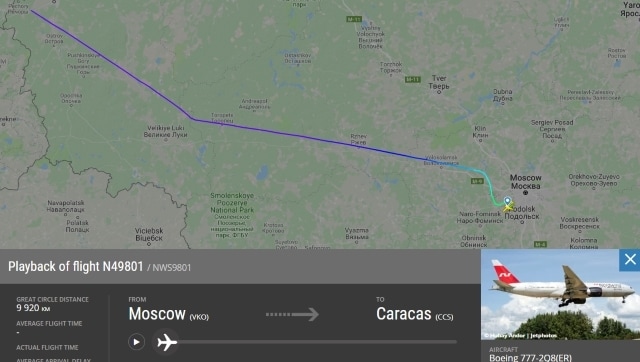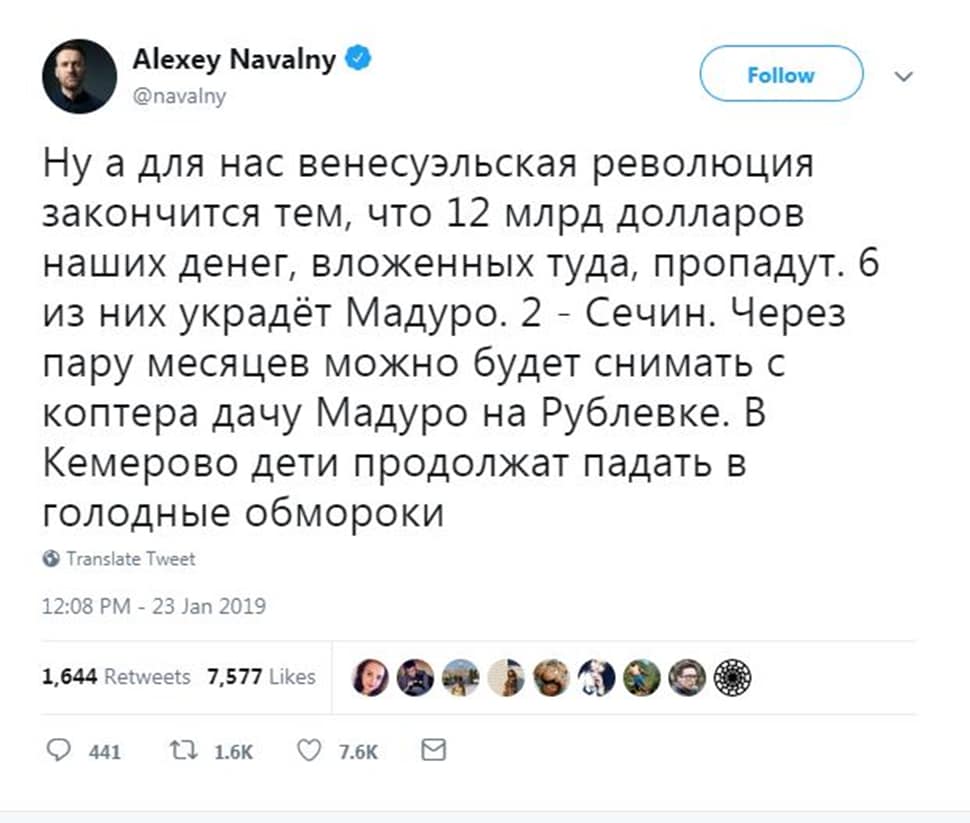Russian officials blamed the Venezuela crisis almost exclusively on the US. However, some Russian commentators are convinced that the "American blitzkrieg has failed" and that Maduro will remain in power, strengthened by the support of the Venezuelan army and the international community. Other commentators are more critical and view the Venezuelan crisis as the biggest failure of Russia's foreign policy.
Meanwhile, Russia has sent a "mysterious" plane to Venezuela. On January 28, at 2 pm a passengerless Boeing 777 – Nordwind Airlines flight No. 9801 took off from Moscow's Vnukovo airport at 2:00 pm en route to Caracas. Nordwind normally services Russian tourist destinations in the Mediterranean and the Indian Ocean.
The plane with a normal capacity of 300 passenger, returned from Thailand in the morning and set off on a new flight to Caracas, after refueling and taking on board two crew members. According to Flightradar24, the arrival of the Russian "Boeing" in Caracas was expected at 8:00 pm local time.[1] One rumor circulating was that the plane took on a cargo of gold from the Venezuelan treasury. [2]
It was reported that the airline had already dispatched two unscheduled flights to Venezuela back in December 2018. [3]
Russia not only fears losing an ally in Latin America, but is also worried that Venezuela with default on its over $3 billion state debt to Moscow. It is worth noting that, on January 28, Washington imposed sanctions on the PDVSA oil company, in order to cut Maduro's main source of revenue. Russia’s Finance Deputy Minister Sergei Storchak commented that Venezuela will face difficulties to pay back Moscow. "Probably there will be problems. All depends on the army, the military, how dutiful they will be," Storchak said.
He also added that the next payment of over $100 million is planned for the end of March. "Payments are made in September and March. There have been no overdue payments," Storchak stated.[4]
The Russian Finance Ministry added in a statement that the agreement on restructuring Venezuela’s debt to Russia did not change. "There is an agreement between Russia and Venezuela on restructuring Venezuela’s debt that stipulates the terms and the payment schedule. The next payment is due at the end of March. Russia’s Finance Ministry expects payments as scheduled. There have been no changes made in the agreement, Venezuela has to fulfill obligations to the creditor it has assumed," the statement noted.[5]
Below is an overview of reactions by Russian commentators to the Venezuelan crisis:

(Source: Ria.ru, January 30, 2019)

Flight No. 9801 of Nordwind Airlines (Source: Novayagazeta.ru, January 28, 2019)

(Source: Novayagazeta.ru, January 28, 2019)
Russian Expert Timofeev: Are US Sanctions Against Venezuela A Regime Change Precursor?
Ivan Timofeev, program director of the Valdai Discussion Club in an article about the role of US sanctions in Venezuela, titled "Are US Sanctions Against Venezuela a Regime Change Precursor?", wrote the following:
"The sanctions buildup against Venezuela coincided with serious fluctuations on the oil market, so it is quite difficult to measure the economic damage caused by the sanctions themselves. Nevertheless, if the current political explosion or subsequent coup attempts do lead to a regime change, American analysts and practitioners will have an additional argument in favor of the effectiveness of sanctions as a tool to influence foreign and domestic policies of target states.
"If this does not happen, that will be a proof of [Tufts University Professor] Daniel Drezner's 'sanction paradox' suggesting the efficiency of sanctions against allies and their low usefulness against opponents on the world stage. China and Russia, as alternative counterparties of Caracas, can play an important role in one or another course of developments."
(Valdaiclub.com, January 25, 2019)
Russian Expert Pshenichnikov: The Large-Scale Military Exercises On February 10 Will Show That The Army Stands With Maduro
Igor Pshenichnikov, an expert at the Russian Institute for Strategic Studies (RISS) – a Kremlin-established think tank – concludes that the "coup attempt" in Venezuela has stalled. "American blitzkrieg has failed, there follows a protracted struggle of nerves," Pshenichnikov added.
"The US is now putting a lot of pressure on Venezuela. It is already known that the US blocks the assets of the state oil company PDVSA and prohibits any US citizen or entity from buying Venezuelan oil under the threat of personal sanctions. All financial instruments that may be used by the Venezuelan government, including the state account of the country abroad, are also blocked. The Americans are literally tightening the noose around Venezuela. Maduro can only count on Caracas' endurance, the Venezuelan army strength, and the international support," Pshenichnikov said.
He observed that the large-scale military exercises scheduled for February 10 [till February 15], will be a "moment of truth." Pshenichnikov added that "the legitimate" President hopes to demonstrate the unity of the Venezuelan army to external opponents, especially the US and its closest neighbors, Colombia and Brazil.
(Riss.ru, January 29, 2019)
Russian Expert Burykh: The US Is The Main Culprit
Another Russian Institute of Strategic Studies (RISS) analyst, Dmitry Burykh, commented: "Concerning the army, and the security apparatus in general, its position will be crucial for any further development of the situation inside Venezuela. So far there are no signs that the army will side with the coup participants …
"The United States is the chief promoter of this escalation, but they are deliberately trying to take a back seat and move its Latin American allies to center stage so that they take at least partial responsibility. These allies following Washington's lead have managed to exacerbate the situation to the extreme," Burykh said.
(Ria.ru, January 24, 2019)
Russian Expert Korotchenko: Thanks To Russian Weapons, Venezuela Is The Most Combat Ready Army In Latin America
Russian Defense Ministry's Public Council member Igor Korotchenko said: "Thanks to massive deliveries of Russian weapons and to the training of local specialists in their operation, most of which were carried out under President [Hugo] Chavez and which terminated under [Nicolas] Maduro, today the Venezuelan army is one of the most combat-ready in Latin America," Korotchenko said.
(Ria.ru, January 24, 2019)
Venezuela is the largest importer of Russian weapons in Latin America. In 2013 it signed contracts for purchasing weapons in a total amoun of 11 billion dollars. The weapons that Russia delivered to Venezuela include: T-72B1V tanks, Smerch and Grad rocket launchers, BTR-80A armored personnel carriers, Pechora-2M, S-300, Buk-M2EK anti-aircraft complexes.
(Ria.ru, January 24, 2019)
Russian Expert Pyatakov: The Conflict Between The US And Venezuela Should Be Viewed In The Context Of Washington's Growing Confrontation With Beijing
Andrei Pyatakov, a senior research fellow at the Center for Political Studies at the Institute of Latin America (Russian Academy of Sciences), wrote: "… A US military intervention in Venezuela is extremely unlikely. Currently, the confrontation looks like a permanent 'verbal war.' Venezuela's government is under tremendous psychological pressure by constant threats. The military conflict option is only possible from the direct allies of the United States, primarily Colombia and Brazil, with whom Venezuela has common borders. The military bases in Colombia, where the US military feel quite in freedom, are a necessary and sufficient infrastructure for a hypothetical intervention. In June 2017, the United States conducted naval exercises with the participation of 17 Latin American allies in the Caribbean Sea near Venezuela. Such experience can be used in the present situation.
"If the United States does decide on a direct military intervention, this would lead to a civil war. The US would face colossal resistance. The Venezuelans actively adopted the experience of Cuba regarding possible fight against foreign intervention. It is enough to say that that two million Venezuelans are members of the so-called 'militias'. These are paramilitary civilian formations, that also conduct regular military exercises and have extensive military experience. It is the militias that form the basis of the regular army.
"In addition, the conflict between the United States and Venezuela should be viewed in the context of Washington's growing confrontation with Beijing. Venezuela has set a goal to increase the volume of oil exports to China to one million barrels per day. In case these flows stop, China will suffer significant energy losses.
"If the pressure on Venezuela leads to a real change of power, it will be possible to speak of the final end of the 'left turn' in Latin America. The 'right turn' has already engulfed most of the states in the region, and Venezuela remains the last centripetal force of the left forces of Latin America. This is the Bolivarian Alliance, which unites ten states, six of them being small English-speaking island states of the Caribbean region. Venezuela's exclusion from this chain can have a 'domino effect'. However, this is unlikely to affect at least Cuba, which since 2011 has been carrying out careful adaptation reforms and is already preparing for the frontal offensive of the 'right turn."
(Valdaiclub.com, January 24, 2019)
Russian Journalist Yermolin: Venezuela Is The Most Significant Failure Of Russia's Foreign Policy
Russian journalist Vladimir Yermolin presented a much less flattering appraisal of the situation in the Russian media outlet Rosbalt.ru in an article, titled "Venezuela - The Most Significant Failure Of Russia's Foreign Policy."
Yermolin wrote:
"Venezuela is not the first failure of Russian foreign policy but given its obviousness is unfortunately the most illustrative. Only a lazy bones could not predict Maduro's collapse. Maduro – is 93% of the population below the poverty line, people are undernourished. Maduro is an annual inflation rate of more than a 1000000%. Maduro – 90 thousand annual deaths from criminal banditry. For whom was this a secret? In the foreign ministry an entire team of specialists on that country is pulling up their pants...
"In any case an entire series of private Russian companies got out of Venezuela already in 2017. And the very smart ones never stuck their feet into this socio-economic sewer. I think that the very same specialists that consulted the Kremlin consulted them. Only businessmen value money, while the Kremlin baby sitter values his own chimeras...
"It is amazing how long foreign policy idiocy can be considered in the eyes of many Russians 'a special path'. There is only one thing special about it a dumb repetition of mistakes."
(Rosbalt.ru, January 24, 2019)
Russian Opposition Leader Navalny: Maduro Will Find Diplomatic Exile In Moscow
Russian opposition leader Alexey Navalny also claimed that Venezuela was a disaster for Russia and tied the debacle to his signature issue – the fight against corruption:
Navalny wrote in his Twitter account:
"Well for us the Venezuelan revolution will conclude with 12 billion dollars of our money invested that there will vanish. Six of these (billions) Maduro will steal. [Rosneft CEO Igor] Sechin will steal two. Two months later it will be possible to extract Maduro by helicopter to [diplomatic exile] in [Moscow's swanky neighborhood of] Rublevka. In [the Siberian city of] Kemerovo children will continue to collapse from hunger."
(Twitter.com/navalny, January 23, 2019)

(Source: Twitter.com/navalny, January 23, 2019)
Liberal Yabloko Party Leader Yavlinsky: 'We Must Deal With Our Country, Not Maduro!'
Grigory Yavlinsky, chairman of the liberal Yabloko party's Federal Political Committee criticized on his Telegram Channel the policy of helping dubious allies while neglecting domestic priorities:
"'Brotherly' Bashar al-Assad defended. Now we will be defending the sovereignty of 'brotherly' Nicolas Maduro.
"Venezuela is 'our strategic partner,' the Foreign Ministry said. But for Putin, not Venezuela is a partner, but Nicolas Maduro. But only the people can be a strategic partner of Russia. And the people, apparently, want to shove Maduro out.
"As for the sovereignty, it would be good to think about our own sovereignty: the poor quality and small size of the Russian economy, the dependence of the ruble on the dollar, the budget, which is completely dependent on New York and London oil prices, on [Russian aluminum giant] Rusal, which is now fully controlled by the US Treasury, poverty of the majority of the population in Russia… We must deal with our country, not Maduro!"
(Yabloko.ru; January 24, 2019)





